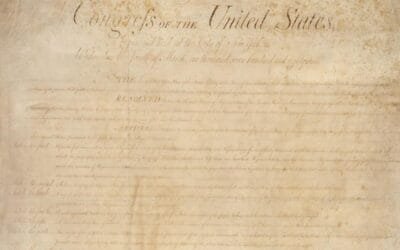Anti-Federalists, who feared a powerful central government, demanded greater assurances.
Constitution
Can Trump legally send troops into our cities?
There are arguments on both sides, many of which are fact-specific and depend on constantly changing circumstances.
The U.S. Constitution, the Bedrock of American Freedom
The purpose of a constitution is to define the structure and rules by which a government operates. In the case of the United States Constitution, those rules are—contra to most other such constitutions—explicitly designed to limit the government’s authority.
Do Legal Checks on a President’s Power “Diminish the Votes of the Citizens Who Elected Him”?
Requiring that a president conduct himself within the bounds of the law does not somehow “diminish the votes of the citizens who elected him.”
What If the Federal Government Begins Defying Court Orders?
Would a determined executive ever fall back in the end on the core power asymmetry between the two branches—it has guns, and the judges don’t?
Who Controls the Administrative State?
Not a day goes by when the New York Times does not manufacture some maudlin defense of the put-upon minions of the tax-funded managerial class. In this worldview, the agencies are always right, whereas any elected or appointed person seeking to rein them in or terminate them is attacking the “public interest.”
Governments Shouldn’t Be In the Lending Business
Had one of the individuals at the Constitutional Convention said, “Should we write in a power for the government to lend money?” the reply from everyone else would have been “No.”
Is Trump’s Mega-Fine Unconstitutional?
If the Supreme Court were to grant review, it would have to consider two issues: the first is whether this state-imposed fine and others like it are covered by the Eighth Amendment; if so, the second issue would be whether the fine of $464 million is excessive.
Donald Trump Is Being Denied His Constitutional Right to Due Process
Trump’s opponents believe that the reelection of President Trump would be more dangerous than compromising his constitutional rights. That is a shortsighted view that endangers future generations of Americans.
John Locke, The U.S. Constitution and the General Welfare
John Locke’s view reflects the fact that a government that has nothing of its own to give, but can only give what it takes from others, means it cannot “give” to some without involuntarily violating the general welfare of others.
No, the 14th Amendment Can’t Disqualify Trump
Interpreting this post-Civil War amendment as a general provision for disqualifying candidates who some people may believe participated in what they regard as an insurrection or rebellion—as distinguished from a protest or even a riot—would create yet another divisive weapon in our increasingly partisan war.
The Biden Administration’s Unconstitutional Tax on “Unrealized Capital Gains”
The Biden Administration’s 2023 budget bill proposing a “billionaire tax,” imposing a 25-percent minimum rate on the “unrealized capital gains” of the wealthiest Americans is unconstitutional.
The Astonishing Implications of Schedule F
The gradual rise of the 4th branch of government (the administrative “deep state” bureaucracy) which is very much the most powerful branch – has reduced the American political process to mere theater as compared with the real activity of government, which rests with the permanent bureaucracy.
The Mighty Gorsuch vs. the Administrative State: Quotes from West Virginia vs. EPA
Justice Gorsuch rules against the dictatorship by the administrative state, in favor of the system established by the Constitution’s framers.
No Time to End the Filibuster
While one political group may not benefit from the filibuster on a current issue, they may find it very valuable protection in the future. Senator Warren be warned: You may not like the consequences of your campaign.
Lessons from a Review of A Declaration and Constitution for a Free Society
Professor Brian Simpson answers arguments against using Ayn Rand’s philosophy Objectivism as the basis for improving the Declaration of Independence and the U.S. Constitution.
Making the U.S. Constitution Fully Consistent with Individual Rights
“A Declaration and Constitution for a Free Society” modifies the Declaration of Independence and the U.S. Constitution to make them fully consistent with the protection of individual rights and freedom, using Objectivism—the philosophy of Ayn Rand. It demonstrates why a free society is morally, politically, and economically beneficial to human life.
The U.S. Founders’ Inventive Constitutional Brilliance
This Constitution Day, thank the Founders for stimulating ingenuity by applying “the fuel of interest to the fire of genius.” And while you’re at it, thank an inventor.
The Constitutional Protection of Intellectual Property
Both Founding Era sources and 19th-century court decisions, official statements, and commentaries confirm that intellectual property rights are property as a matter of basic legal doctrine and constitutional principle.
A Declaration and Constitution for a Free Society
Making the Declaration of Independence and U.S. Constitution Fully Consistent with the Protection of Individual Rights.
How Populism Turns a Constitutional Republic Into A Democracy
Populism is what happens when a republic becomes a democracy, and politicians must curry the favor of voters in order to win office.
The Coronavirus Doesn’t Override the Constitution
Politicians rush to limit our choices in the name of “keeping us safe.”
‘Veggie Burger’ Ban: Mississippi’s Unconstitutional Advertising Restrictions
The government has no power to keep consumers in the dark—or to prohibit the use of terms that consumers understand—in order to protect special interests from honest competition.
U.S. Constitution Gives the Trade Power to Congress Alone
Republicans must join with Democrats to end Trump’s tariff authority. They should repeal these “emergency” laws that allow the president to unilaterally impose new taxes on Americans, in defiance of the intent of the framers of the Constitution.
Subscribe for free.
Latest pro-Capitalism goodness sent weekly to your email box.
No spam. Unsubscribe anytime.




















